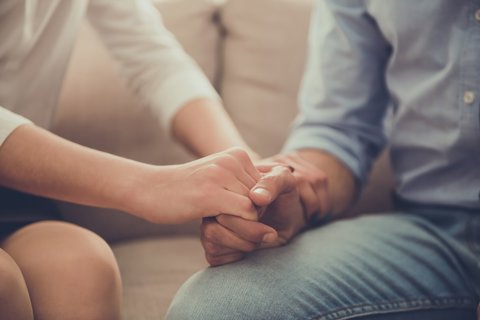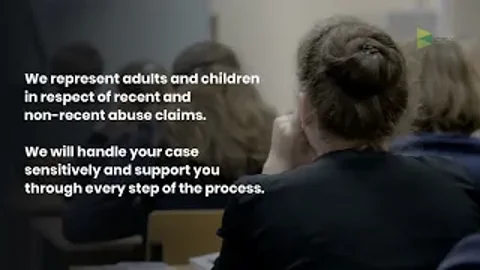
Liam Goggin
Director of Public Law Practice Area
Our specialist team of Abuse Claims Solicitors understand the courage it takes to speak about what has happened to you. It may have taken you many years to tell someone what you have been through. You can trust that our Solicitors are sensitive, understanding, and easy to talk to.
Most abuse survivors tell us that coming forward and making a claim is not about getting compensation. We’ll handle your case with the compassion it deserves, offering you help and support throughout the whole process. We can provide you details of organisations and survivors groups who are specialists in providing support to abuse survivors.
Our Abuse Team have been helping survivors for more than 30 years and can support you in taking the first steps towards making a civil claim or criminal injuries claim. We’ll do everything we can to make the whole process as easy as possible for you.
Contact us for a free case assessment, and we’ll talk to you about how we can help. Ask about whether you qualify for Legal Aid or if we can deal with your claim on a No Win, No Fee basis.

An abuse claim is a legal action against a person or organisation who have harmed an adult or a child and/or failed to protect them from harm when they had a duty to do so. Abuse is never the survivor’s fault, and you have a right to claim compensation for the abuse you suffered and to hold your abuser accountable for their actions.
Abuse can take many forms, including sexual abuse, child abuse, emotional abuse, domestic abuse, and physical abuse. Our Abuse Claims Solicitors provide a safe environment for you to tell your story. You can relax knowing that our expert team will be by your side throughout the entire claims process.
Abuse can take on many forms and through talking to us and other support professionals, you may find you are a survivor of more than one type of abuse. Our Solicitors can help you with:
Sexual abuse happens when someone forces you to do something sexually that you do not want to do or, when they are in a position of power, entices you to participate in sexual activity. Sexual abuse can happen to adults and children.
Child abuse is the physical, emotional, mental, or sexual abuse of a young person. It can also take the form of neglect.
Historical Abuse Claims
This is abuse that occurred in the past, sometimes years or even decades ago. Regardless of how long ago the abuse happened to you or who your abuser was, our Solicitors will listen compassionately to your story and help you get justice.
Domestic abuse is where you are being abused by someone in your home, often by a spouse or partner. It can happen to anyone and is not your fault. Our Abuse Solicitors can work alongside our Family Law team
Emotional Abuse Claims and Physical Abuse Claims
Emotional abuse is where someone uses words or behaviour to control you. It can involve being humiliated, insulted, criticised, or neglected. Physical abuse can include being punched, pushed, kicked, or bitten. Both emotional and physical abuse can leave the survivor scared and vulnerable. You can trust us to take steps to make you safe while you go through the abuse compensation claim process.



A survivor of abuse may be able to make a claim for compensation. Our Solicitors will quickly tell you whether there is enough evidence to proceed with an abuse claim. If the survivor of abuse is a child or too emotionally distressed to deal with litigation process, a parent, guardian, or another responsible adult can bring a compensation claim on their behalf.
If we can take on your case, we will support you through the entire process. We’re friendly, easy to deal with, compassionate, and will keep you updated on your claim’s progress every step of the way.
Many abuse survivors keep quiet about the abuse they suffered for years. Just speaking to us can help you realise that what happened to you was not your fault. Our clients tell us that bringing an abuse claim helps them get closure and regain the confidence their abuser stole from them.
You may be unsure if what you experienced was actually abuse and whether anyone will believe you. We’re always ready to listen to you and can tell you if you are able to bring a compensation claim. You can trust we’ll provide a safe environment; if finally talking about the abuse turns out to be traumatic, we’ll provide details where you can access the support you need.
Compensation can help you fund therapy and make the changes you want to rebuild your life. Making a claim can also make your abuser accountable for the pain they have caused you if we are able to bring a claim direct against your abuser.
What matters to us above all is you get the right result for you. We’ll guide you through all the possible outcomes and work towards those that make you feel that justice and closure have been achieved.
The Criminal Injuries Compensation Authority (CICA) is a government funded organisation focused on compensating innocent victims of violent crime including abuse cases. In many cases, especially those involving historical abuse, there is no person or organisation who a claim can be brought against. CICA can give compensation as long as you are eligible under the rules of the scheme.
Our Solicitors are highly trained and experienced in talking to and supporting abuse survivors. We understand how hard many people find it to come forward. Through compassion and understanding, we can help you achieve closure and justice. We can also refer you to support services and other charities who can help support your mental health.
You may not have considered claiming compensation, but you must remember that what happened to you was not your fault and the money you receive can help you achieve the life you want and deserve.
Our Abuse Claims Solicitors will make the compensation process simple and easy by going through the following steps:
Talking to us is the first and bravest step to making an abuse claim. Let our team take the burden off your shoulders.
Most abuse compensation claims are settled outside of court. We know how stressful appearing in court can be, so we do everything possible to reach an early settlement. But if you do have to attend court, we’ll be by your side and supporting you and your family.


The amount of compensation you receive when making a civil claim will depend on your individual circumstances, but will be decided by looking at:
Our Abuse Claims Solicitors will make sure any compensation settlement reflects the seriousness of what’s happened to you in line with current laws and guidelines that apply to your case.
If the abuse happened many years ago you can still make a compensation claim, either against the person who abused you, the organisation that should have protected you, or through the CICA scheme. We’ll help you make an historic abuse claim by working tirelessly to gather the evidence needed.
In most cases, you have three years from the date of abuse to bring a claim. If you were under 18 years when the abuse happened, you have three years from the date you turned 18 to bring a claim.
Claims brought under the CICA scheme have a two year time limit if the abuse occurred in adulthood. If you were under 18 when the abuse occurred and the abuse has been reported to the police you have until your 20th birthday to make a claim. If the abuse happened when you were under 18 and it was reported to the police when you were and adult you have 2 years from the date of the police report to make an application.
Although time limits are normally strictly enforced by the courts, exceptions can be made for historic sexual abuse cases. So, if you are an abuse survivor, contact us immediately to discuss your claim. We can quickly tell you if the courts are likely to extend the time limit for your case.
You can make an abuse claim on behalf of someone else if:
If you are claiming on behalf of someone else, we’ll provide all the support and legal advice you need.

Domestic violence is often perceived only as physical acts of violence – But it’s much more complicated than that. A lot of the time, people witnessing or experiencing this kind of behaviour don’t know that it is domestic violence. It therefore often goes on unreported and is often ignored. But domestic violence can happen at any point in a person’s relationship and there are many forms that it can take.

Institutional abuse, also known as organisational abuse, is when an individual or group of individuals are neglected or suffer because of poor care practices within an organisation or care setting.

If you have experienced physical or sexual abuse and wish to make a claim under the Criminal Injuries Compensation (CIC) Scheme, contact our Abuse Claims Solicitors for free legal advice and a no-obligation discussion.
It takes incredible courage to talk about abuse. You can rest assured that we will keep your personal details confidential and protect your privacy. Should we need to issue court proceedings in your case we can apply to the court for an anonymity order so that you have the right to anonymity.
Survivors of abuse by a famous or high profile person are often afraid no one will believe their story. We’ll not only listen compassionately, we’ll do everything in our power to get justice for you.
By choosing us you can trust that we’ll:
"When I very first came to you, I was so confused, scared, worried, fearful, not understanding things very clearly. I was made to feel very understood, relaxed, at ease in a place where my complaint would be understood."

Mr. W
Client
"I am really pleased with Nathalie. She went above and beyond what I would have expected the service of a Solicitor to be. She was superb. I have no complaints about the service at all. It was all spot on and Nathalie made a very stressful situation as easy to handle as possible."
Miss J Walden
Client
"Really pleased with the service I received from Nathalie Swanwick, she goes beyond and above whats expected to keep you informed of the progress of your case and to fight for the best outcome. Keeps in regular contact and does not charge for every minute she talks to you like some greedy unscrupulous solicitors that are only in it for the money. Knows the law well and has a no nonsense approach would definitely use again."
Sheila
Client
"Thank you Nathalie, Amna and the team who dealt with my case. They were very professional from day one, discreet, friendly and very informative. My case was resolved very fast."
K.L
Client
"Professional, diligent and considerate To leave a review for Simpson Millar is no easy task. The instructions given to their team were from events that happened decades ago. Yet with great patience and professionalism I was afforded the opportunity to right wrongs. This team is hugely experienced, diligent and above all compassionate to your situation - this makes facing the hurdles of the legal process less burdensome and manageable - no matter how difficult you think it will be. Excellent communications - even over protracted periods of inactivity from other parties. I would recommend this team wholeheartedly. Thank you Simpson Millar and especially deep thanks to N.Swanwick Solicitor (Abuse Department)"
H. Stewart
Cliet
Redress schemes provide a vehicle for getting compensation, counselling, support, an apology, or any other remedy. They can be used as an alternative to making a civil claim. In some cases they can be run at the same time. Redress schemes are becoming increasingly common as they deliver justice for survivors without forcing them to go through the litigation process.
Most redress schemes have their own terms and conditions, and these vary widely in terms of compensation and the time limits for submitting a claim to the Scheme. Talk to our Abuse Claim Solicitors today to find out if a redress scheme provides a suitable resolution for you.
Legal aid is available for abuse cases subject to means and merits criteria. We can swiftly advise you as to whether you qualify.
Absolutely. If we can accept your case your Solicitor will discuss funding with you so you understand what it involves. You can trust us to be completely transparent when it comes to our fees.
Although it is helpful for us to have police reports to present as evidence, it is not essential that you have told the police about your abuse. But if you are making a claim under the CICA scheme, you will need to tell the police what has happened to you.
Yes. The key difference between a civil claim and criminal prosecution is that the former has a lower standard of proof. In a civil claim you need to show that on the balance of probabilities, the Defendant abused you. If you succeed, the Court will award you compensation. To gain a criminal conviction, the Prosecution must prove beyond reasonable doubt that the Defendant abused you, which is a much higher threshold.
There are several support organisations dedicated to helping abuse survivors, including:
Yes, but it is vital to remember that a family member may not have the funds to pay a compensation award. Our Abuse Solicitors will advise on who you may have a claim against.You may also be able to bring a claim for Criminal Injuries Compensation.
Yes, you may be able to make a claim if you suffered abuse by another child. So, for example, if you were abused by another child at a boarding school, and the owners of the school knew or ought to have known of the abuse we would advise you to make a claim against the school for failing in their duty to protect you.We would need to consider the circumstances in your case.
You can make a claim through CICA or against the organisation that had a legal duty to protect you from harm. For example, if you are a survivor of emotional and sexual abuse you received in a children’s care home, you may have a claim against the owner/ local authority responsible for running the institution.
Fill in the form below to get in touch with one of our dedicated team members, or call our team today on: 0800 260 5010